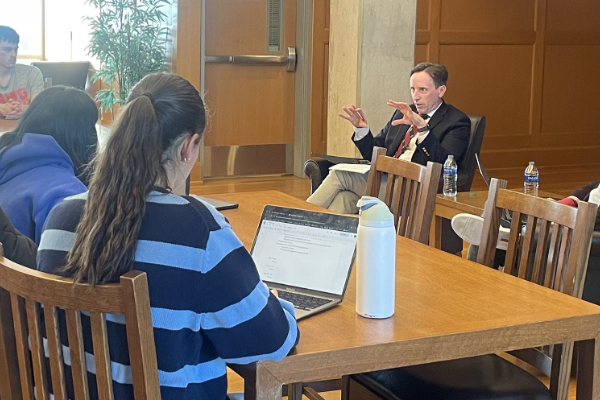2025 Congress: Navigating Promises and Practicalities with Dr. Kevin Kosar

On January 29–30, 2025, the Institute for Democratic Engagement and Accountability (IDEA), in collaboration with Listen.Learn.Discuss hosted a two-day discussion series, both in person and online, with Dr. Kevin Kosar, a Senior Fellow at the American Enterprise Institute (AEI) and OSU alum. Dr. Kosar, a widely recognized expert on the U.S. Congress, governance, and election reform, led the conversation on congressional reforms and the complexities of legislative processes.
The first session, 2025 Congress: Navigating Promises and Practicalities, was a public Q&A moderated by Dr. Michael Neblo, Director of IDEA. The next day, IDEA hosted a roundtable discussion with Dr. Kosar for faculty, staff, and graduate students, focusing on the challenges and opportunities in Congress.
Throughout both discussions, Dr. Kosar addressed a range of critical topics, including the recent Chevron ruling regarding deference, public engagement with Congress, the role of expertise in policymaking, congressional budget and spending challenges, term limits and legislative effectiveness, congressional staff, and institutional capacity.
Dr. Kosar discussed the recent overturning of Chevron, a Supreme Court doctrine that once provided broad deference to agencies to make their own policies and decisions when interpreting statutes. He explained that the court initially intended the doctrine to prevent courts from making policy decisions by allowing agencies to interpret broadly drafted laws instead. However, critics worry that agencies used vague statutory language to expand their regulatory authority. Dr. Kosar explained that the court’s recent decision to strike down the doctrine places the responsibility back on Congress to draft more laws, which presents a significant challenge given the legislative branch's limited capacity.
Dr. Kosar also discussed public engagement with Congress, reflecting on the lack of direct communication between citizens and lawmakers, “How many of you have contacted just one of your members of Congress? … I have never spoken to a group where it was a majority. Never. Often, there’s nobody.”
This disconnect, he argued, leads to disproportionate influence from well-funded interest groups and highly motivated activists, while the average citizen remains disengaged from the legislative process.
The conversation then turned to the role of expertise in policymaking. While Dr. Kosar acknowledged the power of social media to mobilize political energy, he also cautioned:
“Social media has fueled a lot of interesting political energies,” he remarked, emphasizing that policymaking requires sustained effort, deep knowledge, and institutional expertise that online activism alone cannot replace.
Students came ready to engage. One asked why Congress consistently delays critical budget decisions until the last moment. Dr. Kosar explained that the current incentive structure does not reward early decisions, describing a cycle where leaders defer spending bills until they can force a last-minute vote, creating urgency that pressures lawmakers into swift approval. This tactic, he argued, contributes to inefficient governance and increases the likelihood of shutdowns or rushed resolutions.
Another student raised the issue of term limits and whether long tenures reduce efficiency. Dr. Kosar responded: “Political science research shows that shorter terms often result in weaker legislators who lack the experience necessary to craft effective policy.”
While acknowledging frustrations with career politicians, he emphasized that frequent turnover leaves lawmakers more vulnerable to external influence and lacking institutional knowledge.
The discussion also covered the idea of a Congressional Regulation Office. One student asked whether such an office could help manage oversight complexities. Dr. Kosar referenced past efforts like the Office of Technology Assessment and suggested that integrating a regulatory unit into the Congressional Budget Office could be feasible.
In closing, Dr. Kosar offered a broader reflection:
“We have a resilient system. We’ve made it through some really bad things in the past,” he concluded, urging students to stay engaged in the democratic process.
The two-day event offered participants rare insights into Congress’s inner workings. As the U.S. enters a new legislative session, IDEA's discussions offer valuable, diverse perspectives. As Amy Lee, IDEA’s Associate Director, noted:
"At IDEA, we know that many students really want to be able to get beyond media coverage and social media reactions about what the 119th Congress is likely to be able to accomplish. We think it’s essential to share a broad spectrum of viewpoints with students, and Dr. Kevin brings very insightful observations from a conservative perspective, as well as incredible institutional knowledge of Congress. We have plans for more speakers throughout the year, and we hope that over the course of it, we’ll be able to share a whole range of new perspectives with students."
The event marked the beginning of a broader dialogue on congressional reform, offering students the tools and the challenge to stay engaged beyond headlines.
